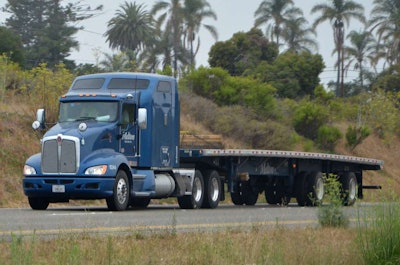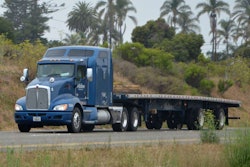 The flatbed company’s voluntary driver wellness program measures blood chemistry, weight and blood pressure and incentivizes healthy lifestyles.
The flatbed company’s voluntary driver wellness program measures blood chemistry, weight and blood pressure and incentivizes healthy lifestyles.Truck drivers as a whole have struggled with health and wellness issues for decades, and the numbers are staggering. The Centers for Disease Control pegs the obesity rate for truckers at more than 50 percent, and the CDC sets life expectancy at 61 years old – 16 years less than the average population. The Bureau of Labor Statistics has labeled truck driving as one of the highest-risk occupations in the country, citing poor diet, lack of exercise and irregular work schedules as major contributing factors.
The driver health epidemic can have huge consequences for trucking fleets. Such was the case for Melton Truck Lines almost a decade ago when the Tulsa, Okla.-based flatbed carrier – like all truckload carriers at the time – was faced with a severe driver shortage exacerbated by poor driver health.
“We were losing good, experienced drivers that liked working here, but their blood pressure was too high, and they couldn’t get their physical card,” says Bob Peterson, company president. “Also, we would bring in new drivers for orientation, and a number of them would flunk their physicals for various reasons.”
About that same time, two longtime Melton drivers died of heart attacks. “All these things were going through my head and caused me to ask myself, ‘What should my position be as president toward our employees?’ ” Peterson said.
Melton also is substantially self-insured for health and dental plans, and an increase in insurance utilization by employees can negatively impact the company’s bottom line.
“Drivers can say, ‘My health is none of your business,’ but in a way, it is my business because I need truck drivers, and I need to minimize the expense to the extent that I can, and I can’t keep raising employee premiums because I have to stay competitive with what other companies are doing,” says Peterson.
Tackling the problem
Six years ago, Melton was one of the first fleets in the industry to address the issue of driver health and wellness head-on. The company hired a wellness coordinator and began steps toward ensuring its employees would have everything at their disposal to be healthier.
“It’s hard for drivers to get in and see doctors on their own, therefore many of them simply don’t,” says Peterson.
To that end, Melton staffed its Tulsa terminal with a full-time nurse and part-time nurse practitioner that are available to employees and their family members at no cost to them. The company’s terminal in Laredo, Texas, also is staffed by a medical doctor to see drivers when they are away from home.
Melton also now has gyms at both its Tulsa and Laredo terminals. “The first time I heard Bob was going to take the smoking lounge out and put in a gym at a trucking company, I thought he’d absolutely lost his marbles,” says Mike Potter, driver manager.
Peterson says that a driver wellness program is especially crucial in a time of a driver shortage. “If we are hiring 40 drivers this week, I know from history that 25 will have metabolic syndrome, 10 will have adult onset diabetes, and half of them will be smokers,” he says. “That’s what we’re bringing into the company because that is what is available out there.”
Introducing iCare
In 2007, Melton introduced its new iCare program to encourage employees and drivers to submit to annual preventative screenings that measure weight, blood pressure and blood chemistry so they will be aware of their current health condition. To do so, the company installed a number of Cholestech blood chemistry-testing machines at terminals across its network.
Employees that submit to the voluntary iCare program receive a significant discount on their insurance premiums. Since the program’s launch, Melton has added iCare Plus. “If you meet four out of five metabolic syndrome factors on the good side, then we give you an additional break on your insurance,” says Peterson.
Employees and drivers that opt not to participate in the iCare program are enrolled in what Peterson likes to call the iDon’t Care program, where insurance premiums are much higher.
For drivers that don’t participate in the plan and continue to make bad food choices and not exercise, Peterson says, “You can do that, but you need to pay more for your insurance if you don’t give a damn about taking care of yourself. We’ll give you all the tools for you to understand your body and medical professionals to take care of you, but you have to care.”
Since its inception, the iCare program has proven to be a huge success. The participation rate among the fleet’s 1,000 drivers is 95 percent.
“The thing that enlightens our employees is when they see those cholesterol numbers and blood glucose levels – it prompts them to maybe make some changes to their lifestyle,” says Bret Bringham, wellness coordinator.
Armed with the blood testing data, Melton’s clinical professionals urge at-risk employees and drivers to take care of themselves. The company also encourages all employees to get regular screenings, such as mammograms and colonoscopies, at the recommended ages. Peterson cites a recent example of an employee the company persisted to get his regular colonoscopy check. When the employee went in for his screening, the doctor discovered he had early-stage colon cancer.
“The doctor asks him why he came in, and the driver said ‘My employer has been pestering me.’ The doctor told him, ‘You’d have been dead in nine months given this type of cancer, but because it was caught early, you are going to live a long and happy life.’ You don’t have to have many of those instances to feel good about what you’re doing,” says Peterson.
Continued health
Melton broke ground in March on its new corporate offices in Tulsa. The 77,000-square-foot facility will include a host of driver amenities, including a 3,400-square-foot fitness facility and outdoor walking and workout station trail.
In addition to providing exercise facilities, the company finds new ways to encourage its employees and drivers to remain active. The Melton Road Warrior Program offers up to a $30 reimbursement for participation in company-sanctioned events, including running, walking and cycling.










